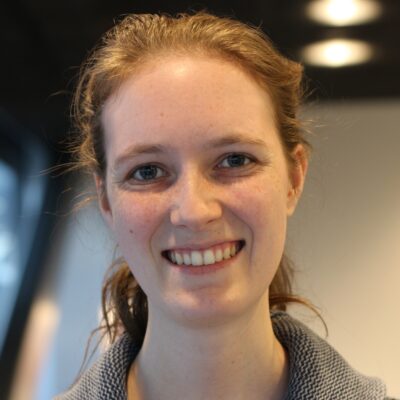Student Spotlight: Katherine Van Koevering

August 26, 2024
Katherine Van Koevering is a doctoral candidate in computer science from Seattle, Washington. She earned her bachelor’s degree from the University of Washington and now studies social networks from theoretical and practical perspectives under the guidance of Jon Kleinberg at Cornell.
What is your area of research and why is it important?
I research social networks from both a theoretical and practical perspective. Networks can be useful in explicit ways – understanding how people connect on social media or how information travels through the internet – and implicit ways – organizing our language or behavior into network structures can reveal new patterns. Networks are complex mathematical objects and can encode diverse and dense information in unique ways that allow for novel understanding of complex datasets. I both analyze networks and develop tools for this analysis to understand human behavior and interactions online.
What are the larger implications of this research?
Networks form an often invisible under-layer of so much of our daily lives. Social media creates networks of people and ideas. Epidemiology is based on networks of movement and interaction. Even language can be understood as networks of words. Developing our understanding of networks as a mathematical object, as well as how they behave in the wild, allows us to tackle problems such as information dissemination, changing community structures, and radicalization, which are inherently tied to the networks of social media and epidemiology (we use the same models for viral diseases and viral memes!).
You and a team of five other students from the Cornell Bowers College of Computing and Information Science authored a paper titled, “An Abundance of Katherines: The Game Theory of Baby Naming.” Can you tell us about this?*
The paper (with lead authors Katy Blumer, Kate Donahue, myself, and five other Katherines) was initially written because we all became friends (partially because of our shared name) and thought it would be funny if we wrote a paper together. We decided on the idea of the game theory of baby names partially because it was relevant to our shared name, but partially because it’s separately an interesting question – how should parents strategically pick names for their children, given that other parents are simultaneously making the same decision? And how do these different strategies impact the landscape of names?
Can you speak about the reception of the paper with the joke conference SIGBOVIK and how it gained traction on social media and industry websites?
The paper was published in April and initially reached popularity among computer scientists, especially theorists. However, last month the paper was posted to X by a Ph.D. student at Stanford and gained a large amount of traction. Folks chimed in with their own favorite joke papers, tagged the Katherines they knew, and lamented the difficulty of naming a child. It also hit the front page of Hacker News (widely read among computer scientists). It brought together academics (and parents) of many stripes to laugh at the occasional absurdity of research, of tech, and of the popularity of the name Katherine.
What are your hobbies or interests outside of your research or scholarship?
I enjoy reading, writing, cooking, D&D, and video games! I love storytelling in all its formats – from sharing folk stories to exchanging food traditions. I often host dinner parties (usually attended by several Katherines!), where I generally try to focus on local, in-season produce that is very accessible in Ithaca. I like to read fantasy, sci-fi, mysteries, and historical fiction and have a particular love for Tolkien. I also enjoy traveling and learning about other cultures. And, of course, spending time with my brother – who is also a graduate student at Cornell!
Why did you choose Cornell to pursue your degree?
Cornell is a world leader in computer science research, but especially in research into how computers and computation have impacted and will continue to impact our daily lives. At Cornell I’ve had the opportunity to work with experts in theoretical computer science, social science, and even law. The encouragement for interdisciplinary work is particularly helpful in my area, which is often strongly tied to multiple fields. The field of computer science at Cornell has a deeply collaborative culture where I feel supported both in and out of the lab and have formed lifelong friendships in the process.
